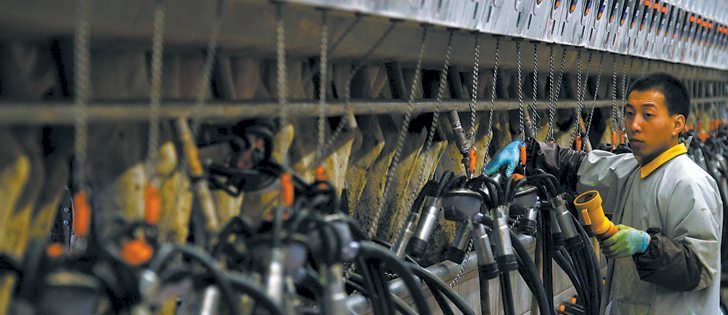Canola Council of Canada feed trial | Milk demand is soaring but China is slow to switch from soybeans
Chinese dairies can boost milk production by using canola meal in place of soybean meal in feed rations, according to a new study.
Feed trials were conducted in 2010 and 2011 by two researchers from the China Agricultural University at dairy farms operated by China’s five largest milk producers.
The Canola Council of Canada and Agriculture Canada paid for the research.
Canola meal was substituted for soybean meal at rates of 3.7 to 10 percent.
Four of the five dairies experienced an increase in milk production. The results ranged from a loss of 0.2 kilograms per cow per day to a gain of 1.2 kg, with an average gain of 0.6 kg.
Read Also

Farm groups ask feds for export sales reporting
The Agricultural Producers Association of Saskatchewan and SaskCrops asks the federal government to create an Export Sales Reporting program.
“We are delighted with the success of this joint research project with China,” said Canola Council of Canada president Patti Miller.
“Canola meal has now proven its value as a feed product in Chinese dairies, opening the door for China’s milk industry to enhance quality and increase production without significantly increasing cost.”
Results of the Chinese study were less impressive than previous North American studies that showed a gain of one litre of milk production per cow per day by incorporating canola meal into feed rations. One kilogram is equivalent to one litre.
Bruce Jowett, vice-president of market development with the canola council, said one possible explanation for the differing results is the difference in genetics and the conditions under which the animals are raised in North America and China.
However, he said the Chinese results are still impressive. There are an estimated 12 million dairy cattle in China. Dairy operations would increase the nation’s milk production by 7.2 million kilograms per day if every one incorporated a small amount of canola meal into their rations.
The council considers that a strong selling point for a market of 1.3 billion people, where milk demand is skyrocketing and milk quality is a major concern.
Brenda Tjaden Lepp, chief analyst with FarmLink Marketing Solutions, said the council is still facing a tough sell.
“Canola meal has always really struggled to get some traction,” she said.
Feed manufacturers tend to be set in their ways and reluctant to incorporate new ingredients.
“It just seems to boil down to it being a relatively tough sector to incentivize change,” she said.
There are exceptions, such as distillers grain, which took the North American feed industry by storm.
Canola meal has had good success in the California dairy industry, but crushers have generally had a tough time moving the feed ingredient. It could be even harder to make inroads in China because of the distance involved and less familiarity with the dairy industry in that country.
Canola meal and seed exports to China have been up and down, and the council hopes the study will help reduce the volatility.
“We want to get a consistency happening there,” said Jowett.
Canola meal exports fell to 303,000 tonnes in 2012 from 586,000 tonnes in 2011 and 825,000 tonnes in 2010, despite the five biggest dairies in the country being aware of the trial results since 2011.
The canola council’s job is to increase awareness of the results, a job that started with last week’s news conference attended by Chinese dairy and feed manufacturer executives and agriculture ministry officials.
“Now that the results have been written up, we can share them,” said Jowett.
The council will follow up by holding seminars in China starting this fall to spread the word.
Jowett doesn’t know what impact the study will have on meal demand, but it could be huge if 12 million cows start consuming one to two kg of the feed ingredient per day.
“The question has come up: would we be able to supply all that they need?”
















